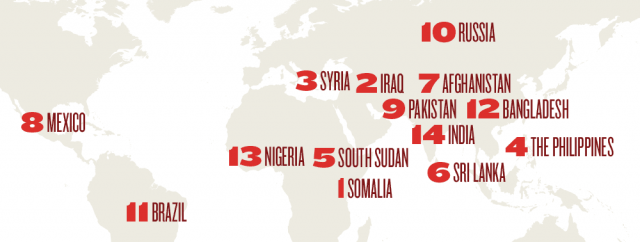Getting away with murder
That Pakistan is one of the world’s most dangerous countries for journalists sounds more like a cliche now

PHOTO: CPJ

While Pakistan’s position remains unchanged in the latest index at number nine, its rating has improved only slightly. Indeed, according to a report prepared by a local NGO, since 2000 approximately 109 journalists and media workers have died in Pakistan — most killed in the line of duty. But so far, only four cases are said to have been solved and the culprits punished. Identifying Pakistan as one of the countries “where potent illegal armed groups actively menace journalists”, the report understandably expresses diminishing hope that the situation will get better. Most disturbingly, the Report maintains that Pakistan has failed to “implement a series of commitments to CPJ to address impunity”. And it justifiably points out that the threats to journalists stream from “… political parties, criminal groups and militants, and corrupt local leaders”, as well as state institutions.
It should be noted that despite having lived in a war theatre for over 35 years, our mainstream media has not produced even a handful of experienced and well-trained war correspondents. That is why when war finally knocked on our own doors sometime in 2005, we were caught unawares. And that is perhaps why we have lost so many journalists in this war in the last 10 years or so. We have also lost a number of journalists covering the armed insurgencies indulged in by the militant wings of political parties in Sindh, as well as in the ones waged by separatists in Balochistan. In fact, today the entire country has become a war zone and every journalist operating in this zone, no matter what his beat, has become a war correspondent but without being trained for the job. There are many aspects of a story that can land a journalist in fatal trouble today — a wrong headline, one single factual error, a truth too close to home, rushing into the crossfire or a riot with your camera and laptop, getting too close to a scene of a first bomb blast, too intrusive for one or the other side or taking up social causes not popular among armed hordes of extremists.
The CPJ Report, while greatly disturbing, also inculcates a sense of hope. Pakistan has been designated as a focus country for the UN Plan of Action for the Safety of Journalists and Issue of Impunity. While there are plenty of laws in our Constitution guaranteeing citizens’ safety and security, there is no law explicitly guaranteeing the safety of journalists. Given the important role of journalists in a democracy, especially one as precarious as Pakistan’s, the feeling is that relying on piecemeal laws has not worked. So, with the passage of the CPJ-suggested Protection of Professionals Engaged in Journalism Act, Pakistan could emerge as an international front-runner in attempts to effectively protect journalists. Agreed that the mere passage of a law would not bring an immediate halt to the violence and threats, but having such legal backing along with the appointment of a special prosecutor dedicated to handling media-related impunity cases “could stiffen the resolve of the legal system to begin to bring to justice those who believe killing a journalist is a solution to addressing media coverage they don’t approve of”.
Published in The Express Tribune, October 12th, 2015.
Like Opinion & Editorial on Facebook, follow @ETOpEd on Twitter to receive all updates on all our daily pieces.














COMMENTS
Comments are moderated and generally will be posted if they are on-topic and not abusive.
For more information, please see our Comments FAQ